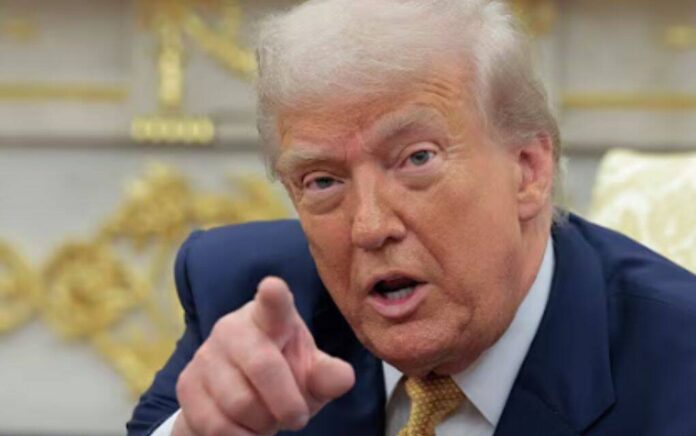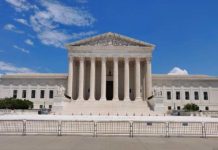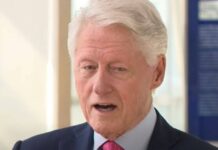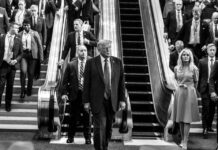
Americans are more nervous than ever about election integrity. President Trump wants to root the fraud out.
And now the Trump admin has made an eyebrow-raising discovery about mass voter fraud.
The Trump administration has intensified efforts to prevent noncitizens from voting in U.S. elections, with U.S. Citizenship and Immigration Services (USCIS) Director Joseph Edlow driving significant policy changes to address the issue. Upon taking office, President Donald Trump issued an executive order to enhance citizenship verification processes, aiming to block foreign nationals from participating in American elections.
USCIS, the agency responsible for overseeing legal immigration, has since allocated resources to assist state officials in identifying and removing noncitizens from voter rolls.
Edlow, who leads an agency of over 20,000 employees managing the nation’s immigration system, emphasized ongoing progress. “We’re already more secure in elections than we were six months ago,” Edlow said to the Daily Caller News Foundation. “My goal is have our next election, the midterms, be one of the most secure elections in American history.”
Confirmed as USCIS director by the Senate in July, Edlow assumed leadership shortly after. Having previously served as deputy director for policy and chief counsel during Trump’s first term, he now spearheads the administration’s push to eliminate foreign influence in U.S. elections.
In March, Trump signed Executive Order 14248, titled “Preserving and Protecting the Integrity of American Elections,” which strengthens citizenship verification and prohibits foreign interference in U.S. elections. The order mandates that the Department of Homeland Security (DHS), USCIS’s parent agency, provide states with free access to the Systematic Alien Verification for Entitlements (SAVE) database to safeguard election integrity.
The SAVE system, managed by USCIS, enables government agencies to verify immigration status or U.S. citizenship for individuals applying for benefits or licenses. State officials targeting voter fraud have praised its impact. “Gaining access to this database has been a game-changer,” Republican Texas Secretary of State Jane Nelson said in June. “Not only have we been able to identify individuals who should not have voted in the last election, we have also been able to confirm naturalization of dozens more.”
Nelson’s statement followed the identification of 33 potential noncitizens who voted in Texas’s 2024 presidential election. Texas Attorney General Ken Paxton later reported that over 100 suspected noncitizens allegedly cast more than 200 ballots in the 2020 and 2022 elections.
“[The SAVE] system, while it initially was used for benefits granting agencies to determine whether someone was eligible for public benefits, it has really been used for this purpose now, and we’ve modernized it to allow secretaries of state and other election officials to batch audit large group, a large, large group of records to determine whether someone is eligible to register to vote,” Edlow said to the DCNF.
In May, USCIS enhanced the SAVE system by collaborating with the Social Security Administration to improve verification of immigration status and citizenship. This update allows state and local officials to use Social Security numbers for voter eligibility checks, streamlining the process since many agencies lack DHS-specific identifiers. For the first time, multiple cases can be submitted simultaneously, boosting efficiency.
“We have now an agreement with the Social Security Administration whereby you can use a nine digit social security number and we can return hits for you to determine whether someone is a citizen or not, for voter verification purposes,” Edlow said. “And we’re continuing to improve it, we’re constantly testing it,” he added. “We’re looking to go down from the full nine to the last four of the social with that yet, but we’re going to get there soon.”
The Trump administration has taken a hardline stance against noncitizens voting in federal elections. In April, federal prosecutors charged two Ukrainian nationals for illegally voting in the 2024 presidential election and a 45-year-old Iraqi national for voting in the 2020 election. In May, authorities charged a Colombian migrant, who lived in the U.S. for decades under a stolen identity, with voting in the 2024 election and fraudulently obtaining approximately $400,000 in benefits, including rental assistance, Social Security, and food stamps.
Quantifying noncitizen voting in past elections remains challenging. In October, Michigan officials charged a Chinese national with voting in the 2024 election after he contacted his local clerk’s office to retrieve his ballot. He fled the country the day before Trump’s return to office.
Beyond targeting individual offenders, the administration has pressed local governments to ensure compliance with voter roll maintenance. In June, federal prosecutors sued Orange County, California, for allegedly failing to provide documentation showing efforts to remove noncitizens from voter lists. The previous month, a lawsuit targeted North Carolina and its Board of Elections for allegedly neglecting to maintain voter registration lists in accordance with federal law.
Edlow reaffirmed USCIS’s commitment to refining the SAVE database and strengthening election security. “As things pop up, we’re going to make changes, and we’re going to make this a better system,” Edlow said. “The worst SAVE is ever going to be is the way that you see it today, because every day we are making more improvements to it.”


















